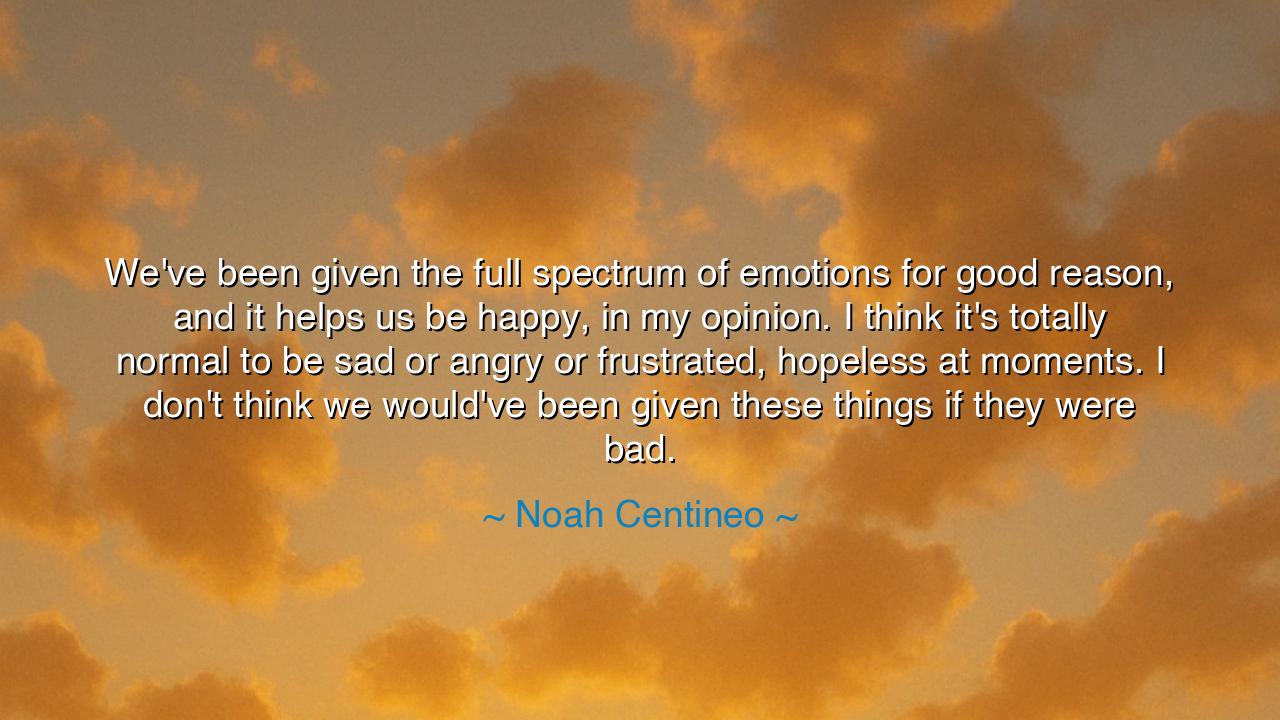
We've been given the full spectrum of emotions for good reason
We've been given the full spectrum of emotions for good reason, and it helps us be happy, in my opinion. I think it's totally normal to be sad or angry or frustrated, hopeless at moments. I don't think we would've been given these things if they were bad.






Hear the words of Noah Centineo, who speaks not as an actor alone but as a witness to the mystery of the human heart: “We’ve been given the full spectrum of emotions for good reason, and it helps us be happy, in my opinion. I think it’s totally normal to be sad or angry or frustrated, hopeless at moments. I don’t think we would’ve been given these things if they were bad.” These words, though modern, carry the echo of ancient wisdom: that the soul was not fashioned to feel joy alone, but to experience the entire range of being, and that even our darker emotions are sacred teachers.
The essence of this saying is that life is not divided into good and evil feelings, but that all feelings serve a purpose. To be sad is to understand the value of joy; to be angry is to feel the fire that defends what is just; to be hopeless is to be reminded of the preciousness of hope. Emotions are not curses, but tools of survival, compasses for the soul. Centineo’s insight is that rejecting them leads to numbness, but embracing them leads to wholeness.
The ancients themselves knew this truth. The Stoic Marcus Aurelius, though often thought to seek detachment, wrote in his Meditations that anger, sorrow, and fear arise from natural causes, and the task is not to condemn them but to understand their roots. Likewise, the Hebrew psalms are filled with cries of rage, despair, and longing, yet they end in renewal. In every culture, the wise have known: emotions are not enemies; they are messengers.
Consider the tale of Abraham Lincoln, a man remembered for strength and leadership. Yet he suffered from what was then called “melancholy,” sinking at times into deep despair. Still, it was this very sadness that gave him compassion, that taught him to lead with humility, that helped him carry the grief of a divided nation. Without his sorrow, his greatness would have been less complete. His life testifies to Centineo’s words: emotions, even painful ones, have reason and meaning.
There is also a hidden nobility in the statement that emotions are “given.” Whether one believes they are gifts of the divine, or simply the design of nature, the truth remains: they are not accidents. If frustration and anger dwell within us, they do so not to poison but to refine. Like iron in the forge, the human spirit is tested by its feelings, and through that testing it grows stronger. To deny emotions is to deny part of what makes us human.
The lesson here, children of tomorrow, is simple yet profound: welcome your emotions, even those that trouble you. Do not despise them as weaknesses, nor hide them as shameful. They are the sacred language of the soul. To be fully alive is to allow the full spectrum of emotions to pass through you, to learn from them, and to let them deepen your wisdom.
Practical action flows from this truth: when you are sad, do not flee—sit with it, and let it teach you empathy. When you are angry, examine it, and let it guide you toward justice, not destruction. When you feel hopeless, remember that such darkness makes the light of hope all the brighter when it returns. And when you are happy, cherish it, for you know the cost by which it is made precious.
Thus the words of Noah Centineo stand as a reminder across the ages: emotions are not flaws to be eradicated, but gifts to be embraced. By accepting the fullness of our hearts—the joy and the sorrow, the rage and the peace—we live as whole beings, capable of both resilience and compassion. In this lies true happiness: not in denying our feelings, but in honoring them as part of the sacred design of life.






AAdministratorAdministrator
Welcome, honored guests. Please leave a comment, we will respond soon